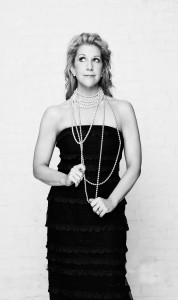DIVA~DIVO Set to be released on January 25
Hot on the heels of winning Gramophone magazine’s 2010Artist of the Year award, the vibrant mezzo-soprano Joyce DiDonato will release her third Virgin/EMI solo album – Diva, Divo – on January 25. This playfully-conceived recital sees the American singer take full advantage of the vocal and gender range of the mezzo repertoire, voicing not only the eager young men of her many “trouser” roles but also passionate heroines. With the dramatic flair and vocal acuity of an operatic natural, she sings an array of roles including Massenet’s Chérubin and Ariane, Mozart’s Susanna, Berlioz’s Marguerite, Bellini’s Romeo, and Strauss’s Composer. Along with DiDonato’s dizzying characterizations, the album explores the same stories in operatic treatments by different composers, so we hear the Figaro story as conceived by both Mozart and Massenet, Faust by Berlioz and Gounod, and Cinderella by Massenet and Rossini.
In her effervescent introductory liner notes to Diva, Divo, DiDonato writes:
“I have always boasted about how wonderful it is to be a mezzo-soprano. Aside from the obvious Toscas or Salomes I would love to have sung, I have never regretted my slightly longer vocal cords, for this genetic blessing has allowed me to portray a wealth of characters from young boys to princesses, from ardent young men to demented, murderous wives. A richer tapestry of human emotions would be hard to find, and that translates into sheer fun for me! It is this exploration of our world, both external and internal, that continually sets me on fire.
“This recording pays homage to the inspired composers and librettists who, through their boundless imaginations and curious minds, forged entirely different musical languages, emotions, and theatrical flavors from the same legend or story. It pays tribute to the wonderful world of the mezzo-soprano, who has always been called upon to bend the genders, to convince equally in both pants and skirts – sometimes even within the same evening – while hopefully retaining an individual and unique sound. And this disc gives me the chance to do what I love most: to bring vastly different characters to life and to explore each of their inner journeys.”
 DiDonato recorded Diva, Divo in September 2010 with the Orchestra and Chorus of Opéra National de Lyon, conducted by Kazushi Ono (see full track listing below).
DiDonato recorded Diva, Divo in September 2010 with the Orchestra and Chorus of Opéra National de Lyon, conducted by Kazushi Ono (see full track listing below).
Gramophone encapsulated DiDonato’s appeal, describing her “feistiness – in the sense of ebullience, of being willing to push, of being able to throw herself entirely into a role with all guns blazing, of being able to project a unique personality at the same time as vivid characterizations.” Besides being named the magazine’sArtist of the Year – an award determined by Gramophone’s readers – DiDonato won for Best Recital disc of 2010, as voted by the magazine’s critics, for her Virgin/EMI album Colbran, the Muse.Devoted to the fiery arias Rossini composed for his wife, Spanish soprano Isabella Colbran, the recital disc cemented DiDonato’s status as the Rossini singer of the moment, scoring high on the Billboard classical chart. As Gramophone’s senior opera critic, John Steane, observes, on Colbran, the Muse DiDonato sings with “a rare purity of tone, ease on the high Bs, an impressive degree of technical skill, and lively powers of characterization,” proving herself “one of the most delightful artists of our time.”
DiDonato earned further praise for her embodiment of Rosina in Il barbiere di Siviglia. Last April, EMI released a DVD of the all-star Covent Garden Barbiere that featured DiDonato in her famous pink cast, which she wore after breaking her leg in a slip on stage. Winning hearts as a peerless trouper, she finished the run of shows wearing that bright pink cast while navigating the set in a wheelchair.
On stage in 2011
Winter and spring of 2011 will once again underscore DiDonato’s standing as one of the most virtuosic, charismatic, and theatrically versatile artists on the international scene – in opera, in recital, and on record. At Houston Grand Opera, the mezzo returns to the role of Sister Helen Prejean in Jake Heggie’s Dead Man Walking (Jan 22-Feb 5). She made her New York City Opera debut in the role in 2002, earning plaudits such as this one from Opera News:
“Joyce DiDonato’s singing and acting of Sister Helen seem not merely perfect but a further creation beyond what composer and librettist could have imagined. Only Helen Prejean herself, sitting in the State Theater’s First Ring on opening night, could have taken the full measure of the impersonation. The role’s inordinate length seemed somehow to nourish DiDonato’s voice; her moods traveled easily and truthfully among religious rapture, clouds of doubt, sassy humor, and feistiness.”
Throughout next February and into March, DiDonato will be joined by pianist David Zobel on an eight-date U.S. recital tour that takes her from Fort Worth, Santa Monica, and her hometown of Kansas City, Missouri to Chicago, Atlanta, Washington DC, Philadelphia, and, finally, New York – where she will make her Carnegie Hall main-stage recital debut on March 6.
From March through May, DiDonato will be based in New York at the Metropolitan Opera, where the mezzo makes her role debut as Isolier in a new Met production by Bartlett Sher of Rossini’s Le comte Ory (March 24-April 21). The cast also includes Juan Diego Flórez and Diana Damrau, and the April 9 performance will be broadcast around the world via the Met’s Live in HD series. Following the production, DiDonato will stay on at the Met to star as the Composer in Richard Strauss’s Ariadne auf Naxos (May 7-13).
The second major tour of DiDonato’s season sees the mezzo taking on her next major Handel challenge, crossing Europe in the dramatic title role of Handel’s Ariodante in performances with Il Complesso Barocco and conductor Alan Curtis. The tour – which is to celebrate Virgin/EMI’s May release of an Ariodante recording with DiDonato, Curtis, and company – starts May 20 in Baden-Baden, Germany, with stops in Paris and London. Of DiDonato’s way with Ariodante’s famous aria “Scherza, infida,” which appears on her Virgin arias disc Furore, the UK’s Observer noted: “Pain mingles exquisitely with sorrow in her daring decoration of ‘Scherza, infida’ from Ariodante.”
DiDonato finishes her season with a July 5-16 run in the title role of Massenet’s Cendrillon at the Royal Opera House, Covent Garden, conducted by Bertrand de Billy. DiDonato’s 2005 Sante Fe Opera performance in Cendrillon was lauded as “full of pathos and dazzling vocalism” by Opera magazine.
http://www.youtube.com/watch?v=eQ5I2TbeISs
Joyce DiDonato: Diva, Divo
Release date: January 25
Label: EMI / Virgin Classics
Track listing:
1. “Je suis gris!” (Chérubin) from Massenet’s Chérubin (1905)
2. “Giunse alfin il momento…” (Susanna) from Mozart’s Le nozze di Figaro (1786)
3. “Deh, vieni, non tardar” (Susanna) from Mozart’s Le nozze di Figaro (1786)
4. “Se mai senti spirarti sul volto” (Sesto) from Gluck’s La clemenza di Tito (1752)
5. “Ecco il punto, o Vitellia…” (Vitellia) from Mozart’s La clemenza di Tito (1791)
6. “Non più di fiori” (Vitellia) from Mozart’s La clemenza di Tito (1791)
7. “Voi che sapete” (Cherubino) from Mozart’s Le nozze di Figaro (1786)
8. “Contro un cor” (Rosina) from Rossini’s Il barbiere di Siviglia (1816)
9. “Faites-lui mes aveux” (Siébel) from Gounod’s Faust (1859)
10. “D’amour l’ardente flame” (Marguerite) from Berlioz’s La damnation de Faust (1846)
11. “Premiers transports que nul n’oublie” from Berlioz’s Roméo et Juliette (1839)
12. “Ascolta! Se Romeo t’uccise un figlio… La tremenda ultrice spada” (Romeo) from Bellini’s I Capuleti e i
Montecchi (1830)
13. “Allez, laissez-moi seul… Coeur sans amour, printemps sans roses” (Le Prince Charmand) from
Massenet’s Cendrillon (1899)
14. “Nacqui all’affanno” (Cenerentola) from Rossini’s La Cenerentola (1817)
15. “O frêle corps… Chère Cypris” (Ariane) from Massenet’s Ariane (1906)
16. “Seien wir wieder gut!” (Komponist) from Strauss’s Ariadne auf Naxos (1916)
Joyce DiDonato mezzo-soprano
Orchestre et Choeur de l’Opéra National de Lyon / Kazushi Ono
Alan Woodbridge, chorus master
with Edgaras Montvidas, tenor; Nabil Suliman, baritone; Elena Semenova, soprano; Pascale Obrecht, mezzo-soprano; Paolo Stupenengo, bass